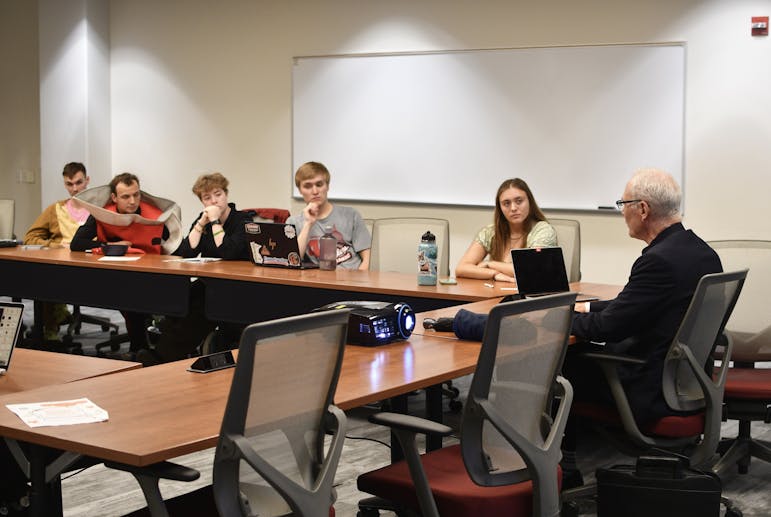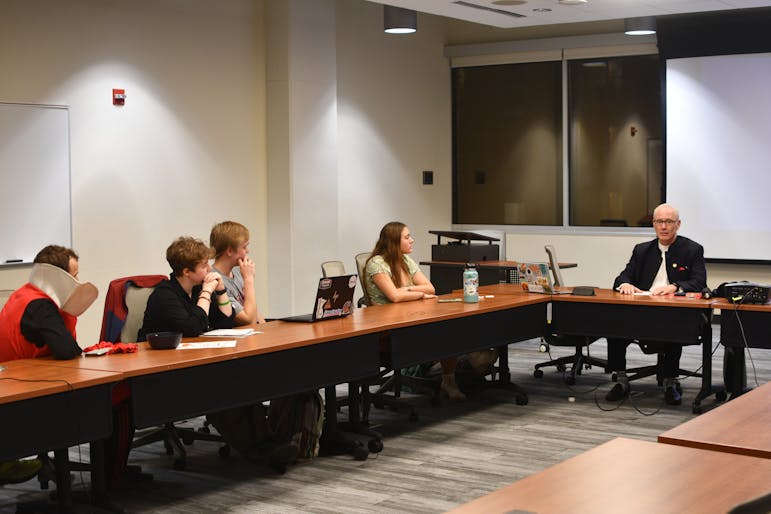University of Wisconsin-Madison alumnus and retired Hawaii Supreme Court Associate Justice Michael Wilson spoke at the University of Wisconsin-Madison on Oct. 26 and 27 to urge action as climate change escalates.
“We're headed on a path. We're going to untold suffering,” Wilson said.
Wilson presented on a “State Constitutions & Climate Change” panel hosted by the UW-Madison Law School, the Nelson Institute and at the the Associated Students of Madison (ASM) Sustainability Committee’s general meeting.
Wilson emphasized the particular cultural and political importance of the environment for Hawaii and its government.
“[Hawaii is] a magical place. It creates a kind of perspective, from the point of view of the government,” Wilson said. “We live in a democracy where nature starts becoming important.”
Hawaii’s Supreme Court issued a ruling recognizing a human right to a stable climate in March 2023.
“The right to life includes the right to a clean and healthy environment,” Wilson said. “It isn't a right that has substance or longevity if you don't have the right to a life-sustaining climate system.”
Wilson highlighted the value of Hawaii’s natural environment and its rapid degradation if the climate crisis continues at its current rate.
“When I was in high school, I hiked to this location with waterfalls. These are the treasures of Hawaii,” he said. “I came down to the beach, and now I realize that it will be gone in about 30 years because of [rising] sea levels."

Former Hawaii Supreme Court Justice Michael D. Wilson speaks during an Associated Students of Madison (ASM) general meeting on Oct. 26, 2023.
What’s the solution
Wilson does not believe climate change can be prevented without a clear and definite goal.
The best plan, he said, won’t lay out all potential changes but will “make a decision on all those things and set it in front of us.”
Wilson asked ASM Sustainability members if they believed the major environmental turning point will be at 1.5 degrees warming or 2 degrees. He asked this to emphasize the lack of clarity in world environmental goals, especially because at 2 degrees Hawaii’s beaches will be underwater.
Wilson likened the climate crisis to David and Goliath: underdog environmental advocates fighting against massive industries and policies “holding up progress.”
There’s a straightforward plan to promote environmental health through government subsidies, Wilson said. Oil companies make massive profits but are one of the most heavily subsidized industries, according to Wilson. Removing subsidies on oil and placing them on renewable energy is a complete solution, Wilson said.
According to an August 2023 government report, renewable energy subsidies comprised nearly half of all federal energy subsidies from 2016 to 2022.
Responding to a question from Joey Bartel in UW-Madison’s Social and Environmental Business Advocates, Wilson said major companies should clearly define their commitment to not destabilizing the earth and stick to the plan out of commitment to their shareholders.
At this time, Wilson said, institutions lack these solutions.
“Is the University [of] Wisconsin-Madison putting together that kind of a plan to give to you to save your future?” Wilson said. “No. I think it'd be politically difficult. Which is unfortunate.”

Former Hawaii Supreme Court Justice Michael D. Wilson speaks during an Associated Students of Madison (ASM) general meeting on Oct. 26, 2023.
Mary Bosch is the college news editor and photo editor emeritus for The Daily Cardinal. She is a second year journalism and sociology student with a focus in data. Follow her on twitter: @Mary_Bosch6






